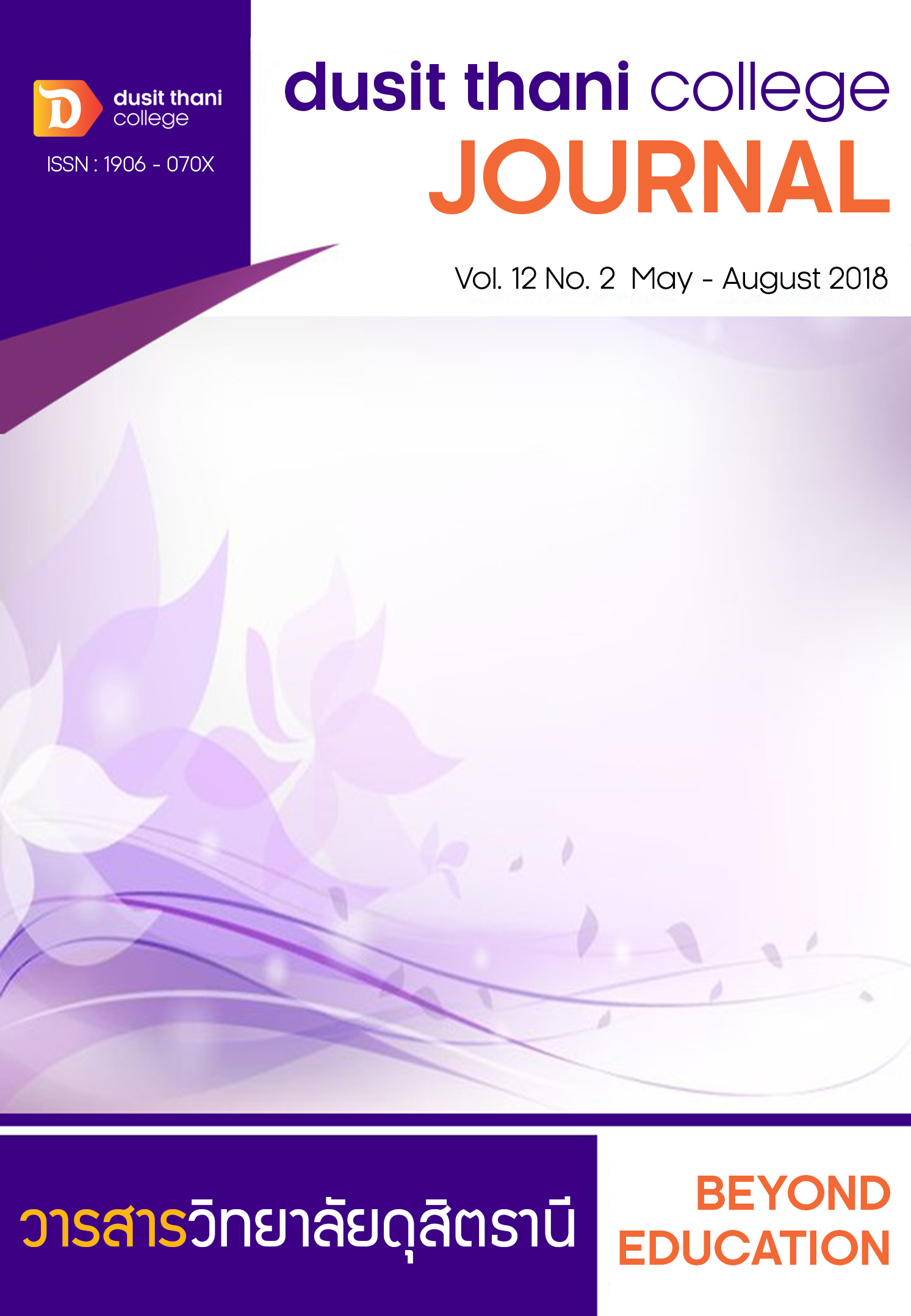Guiedlines for Potential Development of Spa Business Focus on Expectation of Foreign Tourists in Huahin District, Prachuapkirikhan Province
Main Article Content
Abstract
The objectives of this research were to study levels of marketing strategies for foreign tourists affecting customer expectation on spa business in Hua Hin District, Prachuapkirikhan Province, and to investigate spa business potential for resort and spa in aforementioned area. Mixed method approach was employed to analyze collected data quantitatively and qualitatively. In order to analyze quantitative data, 400 foreign tourists who came to spend a day spa treatment was selected as a sample group. While qualitative analysis of data is performed, a set of questionnaires and structured interview were employed through sample group, consisting of 5 people from 5 different resort-and-spa entrepreneurs. The results revealed that informants were female, those aged ranged between 25 - 35 years old, holding bachelor’s degree, coming from European countries, earning monthly income between
50,001 - 65,000, working as employees in private companies, spending their first holidays in Prachuapkirikhan Province, having a spa service plan during their stay in the province, and selected informant enjoying an authentic Thai massage, spending for spa service between 500 - 800 Baht, those booking or making spa reservation through the Internet. Factors affecting customers’ expectation for spa service, in overall, were found at a high level in 4 aspects. In terms of spa business potentials for resort and spa, the Mckinsey7S was used to define strategic plans used in spa business management as follows; 1) Strategy - found that the strategy used in operating the business were products, design and decoration service place, price, and male therapists; 2) Structure - found that there was a clear work division; 3) System - found that there were only some places that brought in Enterprise Resource Planning Software to control the working procedures; 4) Staff - found that all the spa places must recruit therapists that passed the certified training from the institution following the standard required by the Ministry of Public Health; 5) Skill - found that there were only some places that the spa staff in all areas can work as substitutes for one another due to on job work training in all areas, so this resulted in well potential development in employees’ work; 6) Style - found that there were only a few places that used the evaluation standard for operation performance in various tasks (KPI); 7) Shared value - found that spa places that have shared value will result in employees to be more passionate for their organization.
Article Details
Article Screening Policy
- All research and academic articles to be published must be considered and screened by three peer reviews in the relevant field / article.
- All articles, texts, illustrations and tables published in the journal are the personal opinions of the authors. Editors don't always have to agree. And no responsibility whatsoever is the sole responsibility of the author.
- The articles to be published must never be published. Where did you first publish? And not in the consideration of other journals If the audit found that there has been a duplicate publication It is the sole responsibility of the author.
- Any article that the reader sees as being plagiarized or impersonated without reference. Or mislead the work of the author Please let the journal editor know it will be your greatest blessing.
References
Antioned, G., and Van Raaij,W.F. (1988). The Satisfaction of Customers: A Global Managerial Approach.Chicago: Irwin/McGraw-Hill.
Aksonlaem, Watcharaporn. (2004). A Study of Marketing Straregy Which Affects the Behavior of Using Spa Services. Master of Business Administration. Ramkhamhaeng University.
Cohen, M. & Bodeker. G. (2008). Understanding the Global Spa Industry. Massachusetts:Elsevier.
Department of Health Service Support, Ministry of Public Health. (2013). Knowledge document Health Spa Operator.
Gonzalez, Maria Elisa Alen.,Comesana, Lorenzo Rodriguez.& Brea,Jose Antonio Fraiz. (2007). Assessing Tourist Behavioral Intentions through Perceived Service Quality and Customer Satisfaction. Journal of Business Research. Elsevier, 60(2), 153 -160.
Jhusparho, Sujittraporn . (2013).The expectation and satisfaction of tourists toward the tourism products of Songkhla province. Suthiparithat Journal. : 27(84) , 28 - 54.
Khongnantha, Panikarn. (2010). Factors Affecting the Selection of Thai Traditional Massage Services on Khao-Sarn road Bangkok Based on Foreign Customer’s Opinions. Master of Arts Program of Public and Private Management. Silpakorn University.
Lu, I.-Y., & Shiu, J. Y. (2009). Customers' Behavioral Intentions in the Service Industry: An Empirical Study of Taiwan Spa Hotels. Asian Journal on Quality, Vol.10 No.3:73-85.
Mahachai, Vipaporn. (2001) The behavior of Japanese tourists in Chiang Mai to the selection of spa services for health. Master of Science Thesis (Tourism Industry Management).Chiang Mai University.
Merakate, Jitsopin. (2016). Desired Characteristics of Spa Therapists by the Spa Executives and Foreign Customers’ Opinion in Chonburi Province. Journal of Social Sciences.Vol.5 No.2 (July - December). Kasetsart University. Sriracha Campus.
Parasuraman, A., Zeithaml, V. & Berry, L (1988). SERVQUAL: A Multiple-Item Scale for Measuring Consumer Perceptions of Service Quality. Journal of Retailing, 64(1),12 - 40.
Opasanont, Chutima. (Entrepreneurship (Investor's Guide)). Institute for small and Medium Enterprises Development. (Online) Accessed June, 2010. Available from https://www.handbtoday.com/index.Php?lay=show&ac=article&Id=518077&Ntype=5
Rodsom, Voratiya and Nimanon, Kongphu. (2015). Services Marketing Mix Affecting Chinese Tourists Towards Selecting Health Spa in Amphoe Mueang Chiang Mai. Journal of Business Administration Chiang Mai University. 1(3) (July – September)
Sae-lim, Kanokon. (2015). A Development of responsible spa standards: A case study of Anantara Resort & Spa Sikao, Trang. Master of Business Administration. Prince of Songkla University.
Singhnate, Phorjai . (2016). Organizational Resources Management for Success in Spa Business
Services in Thailand. Journal of Modern Management Science.Year 9. No.1(January- June). Lampang Rajabhat University.
Sompong , Chlamarin. (2010). The Perception of Foreign Tourists Toward Tourism in Hua Hin.
Master’s Thesis, M.Sc. (Ecotourism Planning and Management). Bangkok: Graduate School, Srinakharinwirot University.
Wongsapanakul, Ratchadaporn. (2008). Desired qualifications of SPA therapists as perceived by SPA business executives in Mueang District, Chiang Mai Province. Tourism Industry Management M.A. (Tourism Industry Management). Chiang Mai University.


